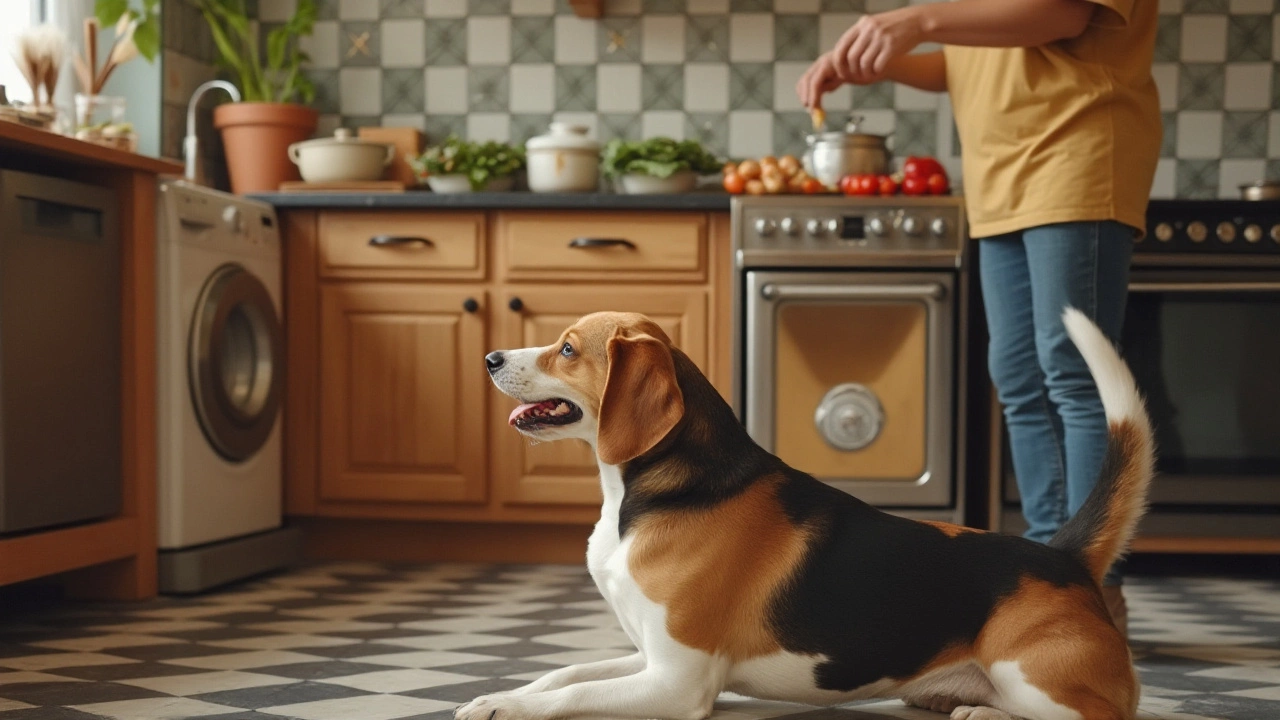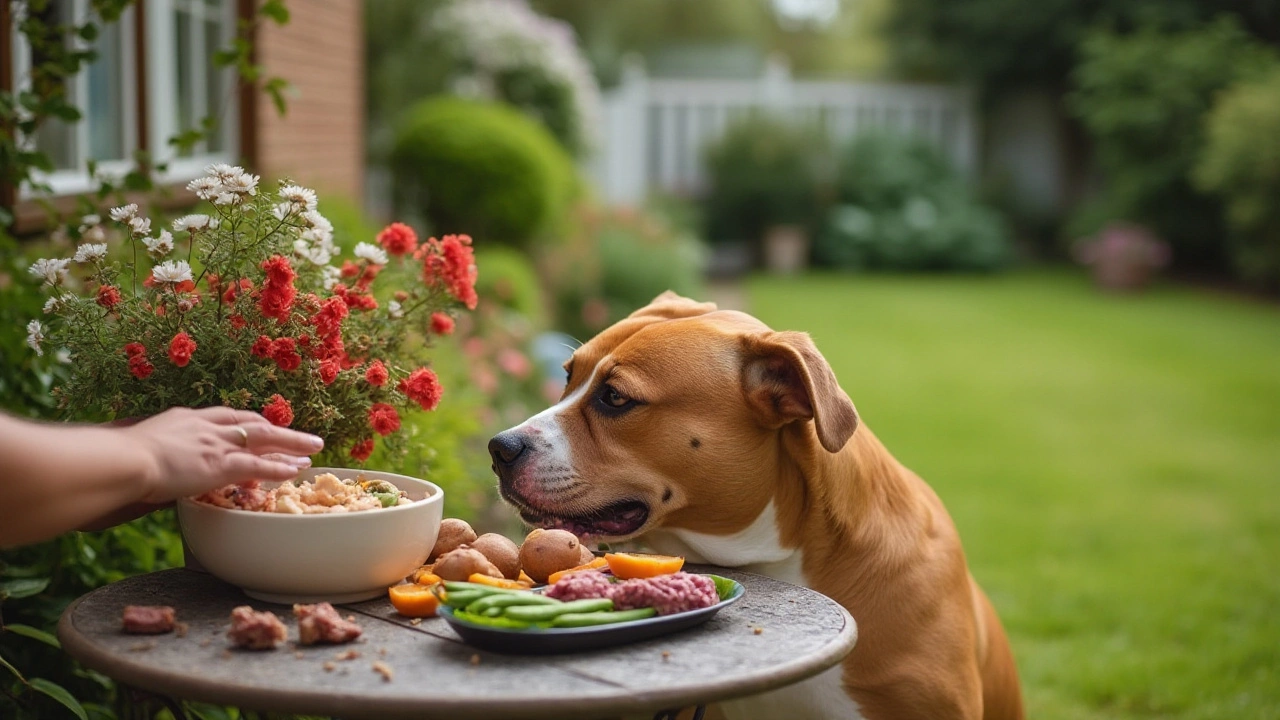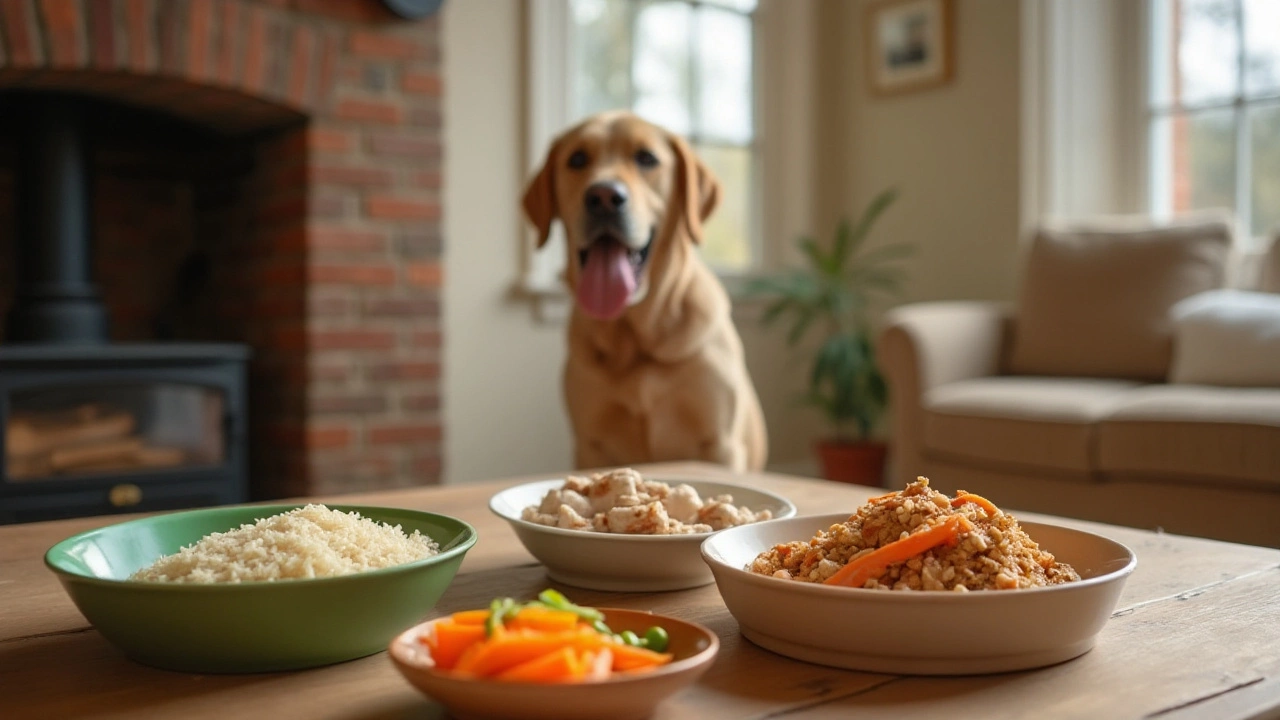If you're worried about affording dog food amidst financial constraints, you're not alone. Many pet owners find themselves in similar situations, and it's important to know that there are alternatives.
There are human foods that can form a balanced diet for your dog, providing all the necessary nutrients while being kind to your wallet. But it's essential to choose wisely and understand the nutritional needs of your canine companion.
By making informed choices about your pet's diet, you can ensure their well-being without stretching your budget thin. Let’s dive into the options you have for feeding your dog when traditional dog food isn't a feasible option.
- Understanding Dog Dietary Needs
- Safe and Affordable Human Foods
- Foods to Avoid
- Crafting Balanced Meals on a Budget
Understanding Dog Dietary Needs
Dogs, much like humans, thrive on a diet balanced with the right nutrients to support their health and energy levels. It's crucial to understand that canines are considered omnivores, meaning they can digest and extract nutrients from both animal and plant sources. However, their dietary preferences lean heavily towards high-protein options derived from animal sources. This keen interest in protein stems from their evolutionary ancestors, the wolves, which primarily feasted on prey. A balanced diet for your dog should consist of about 30% protein, ensuring they receive all essential amino acids necessary for optimal health.
Carbohydrates also make a significant part of a dog’s diet, providing the energy they need for daily activities. Rice, oats, and sweet potatoes are excellent carbohydrate sources that are affordable and readily available. When feeding your dog these staples, ensure they are well-cooked to aid digestion. However, too many carbs can lead to weight gain, so balance is key. Healthy fats, sourced from fish oils or chicken fat, also play a critical role in maintaining a dog’s skin health and energy. It's often recommended that fats make up around 10-15% of their daily caloric intake.
“Proper nutrition is paramount to a dog's overall health, and understanding the balance of nutrients can prevent numerous health issues,” says Dr. Sarah Goldberg, a renowned veterinarian specializing in canine nutrition.In addition to macronutrients, micronutrients such as vitamins and minerals are equally important. Dogs typically obtain these through their diet, with meats and certain vegetables being excellent sources. For instance, leafy greens and carrots are rich in fiber and vital nutrients that can enhance digestion and immune function. As a pet owner, it's imperative to monitor and ensure these essentials are part of their diet to prevent deficiencies that could lead to health complications.
Hydration is another crucial aspect of a dog's diet. Access to fresh, clean water is essential at all times, as dehydration can lead to severe health problems. Dogs require approximately one ounce of water per pound of their body weight each day, which can increase with activity levels or hot weather. Understanding these foundational dietary needs will not only help maintain your dog’s health but will also guide your choices when selecting affordable dog diet options.

Safe and Affordable Human Foods
Navigating the challenge of feeding your dog on a budget doesn't mean your pet needs to compromise on nutrition or taste. Understanding what human foods can safely fit into your dog's diet can offer both variety and savings. Let's start with grains. Cooked plain rice is a great option for dogs as it is an easily digestible starch that can provide a boost of energy when mixed with lean proteins. Brown rice is even better, as it offers more fiber and nutrients compared to white rice. Pasta is another affordable carbohydrate that can be included in moderate amounts, although you should avoid adding sauces that contain onions or garlic, which can be harmful to dogs.
Vegetables offer a bounty of nutrients at a low cost. Carrots, sweet potatoes, and pumpkin are some of the most dog-friendly veggies out there. These are not only inexpensive but also packed with vitamins, fiber, and antioxidants. Dogs often enjoy the crunchiness of carrots, which can also help with dental health. Sweet potatoes and pumpkin can support digestion and provide a sweet flavor that many dogs adore. While coming up with your dog's new menu, remember to cook or lightly steam vegetables, as raw vegetables can sometimes be hard for dogs to digest and might cause gas or bloating.
Proteins are essential for dogs just as they are for humans. Eggs are an economical source of high-quality protein, as well as vitamins and minerals. Scramble or boil them without adding butter or oil to provide a nourishing meal element. Another protein source comes from rotisserie chickens, which often go on sale and can be shredded to remove fat and bones, providing plenty of meat for meals. Keep an eye out for sales on lean meats like ground turkey or beef, which can be cooked thoroughly to remove excess fat and used as a main ingredient in meals.
Dairy products can also be incorporated into your dog's diet, but moderation is key. Items like plain yogurt or cottage cheese can act as great sources of protein and calcium. Some dogs are lactose intolerant, so it's important to introduce these foods slowly and carefully monitor their response. You might be surprised to find that small amounts of these foods can aid digestion and bolster gut health, making your dog's meals both delicious and nutritious.
"An important thing to remember is not every human food is dog-friendly. Consult your vet before making significant changes to your pet's diet," advises Dr. Julia Holmes, a veterinarian in New York. She emphasizes the value of knowing your dog’s dietary needs and any food sensitivities they might have.
When modifying your dog's diet, it's crucial to balance meals to ensure they receive the appropriate nutrients. A dog's dietary needs include proteins, carbohydrates, essential fats, vitamins, and minerals. Offering variety by mixing and matching different human foods can align with these requirements, ensuring your dog stays healthy and vibrant while you maintain your budget.

Foods to Avoid
When considering a change in your dog's diet due to financial constraints, it is crucial to know which foods should be off-limits. Not everything we consume is safe for our canine companions. Some human foods can be extremely harmful, even fatal, to dogs. For instance, chocolate is widely known to be dangerous due to the presence of theobromine, which can affect a dog's heart and nervous system. Many fruits are harmless to us but could pose a serious threat to dogs - grapes and raisins, for example, are toxic and can lead to sudden kidney failure. The same goes for onions and garlic; they contain compounds that can damage a dog's red blood cells, sometimes leading to anemia.
Another common ingredient to watch out for is xylitol, a sugar substitute found in many sugar-free products such as gum, candy, and certain peanut butters. Even small amounts can cause a rapid insulin release in dogs, leading to liver failure. Avocado is another food that's tricky; while small amounts might be tolerated by some dogs, the pit, skin, and leaves contain persin, which is toxic to canine and equine creatures.
Beyond the foods themselves, consider the preparation involved. Fat trimmings from meat, whether cooked or raw, can lead to pancreatitis in dogs. Some cooked bones can splinter in their digestive tract, causing blockages or tears. Always make sure that any meat given to your dog is fully cooked to prevent bacterial infections like salmonella or E. coli, which can affect both dogs and humans.
Veterinary experts from the American Kennel Club warn, "It's critical to understand what foods are dangerous to your pet before offering them any bites from your plate."
While it may be tempting to share your meal with those begging puppy eyes watching your every bite, it's essential to be well-informed. Onions, garlic, and chives, even in powdered form, should be avoided as they're highly toxic to dogs. They can cause gastrointestinal irritation and could even affect a dog's red blood cells if consumed in significant quantities. Alcohol, too, is strictly off-limits, as it can cause intoxication, sickness, and in severe cases, results in a coma.
Here's a quick list to help ensure the safety of your beloved pet:
- Chocolate
- Grapes and Raisins
- Onions and Garlic
- Xylitol products
- Avocado
- Alcohol
- Cooked Bones
Each of these items can pose a risk if included in your dog's diet. When adapting their diet to fit your budget, keep these foods clear of their bowl. Understanding what to avoid not only helps financially but ensures your furry friend maintains a healthy lifestyle. Being cautious and informed equips you to handle any uncertainty in their changing diet.

Crafting Balanced Meals on a Budget
Preparing balanced meals for your furry friend doesn't need to break the bank. It's absolutely possible to provide a nutritious diet by using ingredients you may already have at home, especially when funds are tight. To start with, understanding your dog's dietary requirements is key. Dogs need a blend of proteins, carbohydrates, and fats, along with essential vitamins and minerals for optimal health. Creating homemade meals can meet these needs if done correctly. Knowing which affordable dog diet choices align with their dietary requirements is crucial.
Proteins serve as the foundation of a dog's diet. Chicken, eggs, and fish are excellent sources that you might already find stored in your pantry. You can easily obtain these at a low cost, especially when buying in bulk. Carbohydrates, vital for energy, can come from rice, oats, or sweet potatoes, which are not only affordable but also digestible. These ingredients can serve as a base for the meal while providing those much-needed calories. Add a small amount of healthy fats like olive or fish oil to aid in digestion and maintain a shiny coat and healthy skin.
Vegetables are a great source of vitamins and minerals, and some of the cheap and safe options include carrots, peas, and spinach. These can be chopped finely and mixed with the protein and carbohydrate base. While crafting these meals, always ensure the portions are suitable for your dog’s size and activity level. Dogs essentially thrive on a diet that roughly follows the 30/70 protein to carbohydrate ratio. However, consulting with a veterinarian can help optimize this balance according to your pet’s unique needs. It's a practical approach to feeding your pet without sacrificing quality for cost. As Dr. Lisa Freeman from Tufts University mentions,
"Providing homemade meals on a consistent basis can be both economical and beneficial for their health when done right."
It's important to remember to avoid certain foods. Ingredients like garlic, onions, and chocolate are toxic to dogs and can cause serious health issues if ingested. Paying attention to these details is critical when preparing homemade meals. Start with a simple routine: cook a basic chicken and rice meal, a proven favorite of many dogs. You can vary the ingredients by introducing beef or fish paired with oatmeal on other days, providing variety and balanced nutrition. Emphasize on the budget dog food aspect by planning meals around sales or discounts on bulk purchases at local supermarkets.
Another worthy approach involves incorporating leftovers mindfully. Many foods that might end up in the trash can be effectively reused to form a delicious meal for your pet. Just be cautious not to include anything that's been overly seasoned or greasy. Monitoring your dog's health and weight is vital in adjusting portion sizes and ingredient compositions. By staying attentive and knowledgeable, you can maintain your dog's health and happiness with minimal financial strain. It's all about balancing nutritional content with cost efficiency and using strategic planning to implement a sustainable feeding regimen.
Your creativity doesn’t have to stop there. Look for inspiration from various homemade dog meals recipes available in books and trusted online resources. Many pet owners share their experiences and successful combinations, giving useful insights into alternative meal options. Ultimately, by blending imagination with practicality, you're not only ensuring a nourishing meal plan but also a heartwarming bond between you and your companion.
